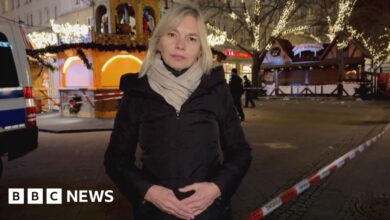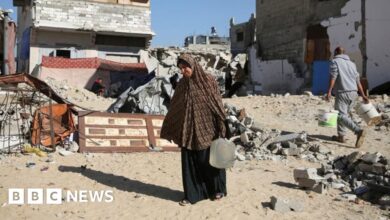The Long Road to Prisoner Deal
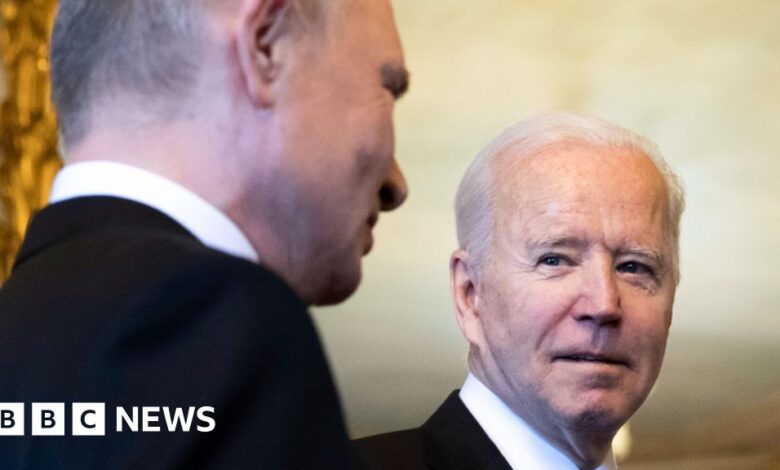
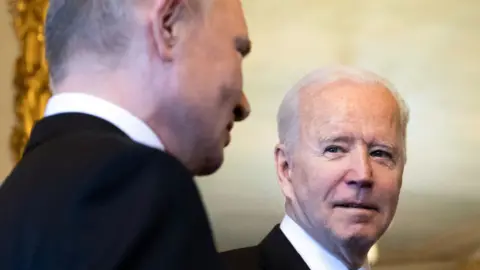 beautiful pictures
beautiful picturesWhen a notorious Russian assassin and an American news reporter boarded two separate flights in Türkiye on Thursday, the event marked the culmination of a secret and dramatic prisoner swap between Russia and the West that had been years in the making.
The origins of the deal, which involves two dozen prisoners, can be traced back to 2022. But behind-the-scenes talks between Russia, the United States and four European countries took place earlier this year before intensifying in recent weeks as a final deal was put forward to all sides.
Those talks were tense and challenging at times. They also came as tensions between the United States and Russia were high over the war in Ukraine. “It was the culmination of many, many months of complex, difficult negotiations,” Jake Sullivan, the U.S. national security adviser who played a key role in the deal, said shortly after the talks.
Senior White House officials provided a detailed timeline of events on a call with reporters, including from the BBC’s US partner CBS, on Thursday. They said the first hint that Moscow might be ready for a deal came in the fall of 2022.
The United States and Russia negotiated the release of Brittney Griner, the American basketball star who was arrested for possession of cannabis oil and sent to a Russian prison. Griner was eventually released later that year in a high-profile exchange with notorious Russian arms dealer Viktor Bout.
But in those conversations, White House officials said, Russia made clear that it also wanted to secure the release of assassin Vadim Krasikov, who is serving a life sentence in Germany for fatally shooting a man in a crowded Berlin park on the direct orders of the Kremlin.
Mr Sullivan told his German counterpart that Russia was seeking Krasikov’s release and asked whether Berlin would consider releasing him in exchange for Alexei Navalny, an anti-Putin activist and opposition leader who is being held in Russia.
However, Germany did not want to release a killer who had committed such a brazen murder on its own soil.
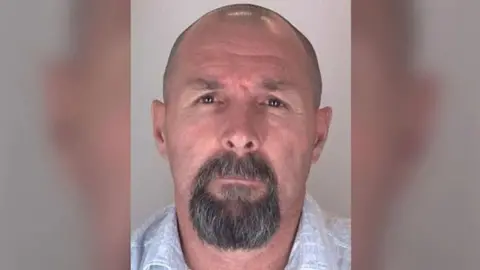 Reuters
ReutersWhile Mr. Sullivan did not get a firm answer from Berlin, initial talks in 2022, between the United States and Russia and the United States and Germany, helped pave the way for a larger and more complex deal signed in recent weeks and completed on the hot tarmac of a Turkish airport.
That’s because both sides have signaled, at least to some extent, what they want. Russia has made it clear that it wants Krasikov.
And Washington doesn’t just want Navalny, it also wants Paul Whelan, a former Marine who was jailed for espionage in Russia in 2018.
The initial elements of a potential swap deal have since begun to take shape – but there is still a long way to go.
In late March 2023, a 31-year-old Wall Street Journal reporter from New Jersey was detained by Russian intelligence agents while on a reporting trip. His arrest sparked a wave of condemnation from the United States and its allies.
A day later, President Biden directed Mr. Sullivan to come up with a deal that would allow him and Mr. Whelan to return home.
The United States reached out directly to Russia. After that, the conversation began in earnest, with their foreign ministers speaking by phone, White House officials said.
But conversations quickly turned from these top diplomats to secret intelligence agencies, something the United States was reluctant to do because Mr. Gershkovich had been accused of espionage and Washington feared that involving the CIA would only fuel those accusations.
As the wheels of these tense negotiations turned in late 2023, the United States understood that the release of Krasikov was key to any successful deal, according to senior White House officials. Offers were made to Russia that did not include the 58-year-old assassin. They were always rejected.
Because Krasikov is in prison in Germany, not the United States, Washington has no authority to release him unilaterally. Mr. Sullivan spoke with his German counterpart almost weekly in late 2023 and early January 2024 in an effort to persuade him to exchange Krasikov and meet Russia’s main demand for the deal.
Any potential deal depends entirely on whether Germany releases Krasikov, according to White House officials.
Moscow’s ultimate position, they said, was that the jailed spies should be released in exchange for the Americans they accused of being spies.
With that in mind, the United States has been scrambling to find more Russian spies held by allies who could be part of a big deal. According to the Wall Street Journal, U.S. officials, diplomats and CIA agents have been scouring the world for friendly governments willing to release prisoners who fit that description.
A sign of their success came on Thursday, when Russians were released from prisons in Poland, Slovenia and Norway.
In February, German Chancellor Olaf Scholz met with President Biden at the White House. And according to White House officials on Thursday, they discussed swap options that included all the key people — Krasikov, Navalny, Whelan, Gershkovich.
There have also been positive signs from Russia. In an interview with former Fox News host Tucker Carlson in early February, Vladimir Putin spoke about Mr Gershkovich. “I do not exclude the possibility that Mr Gershkovich may return to his homeland,” he said.
As BBC Russia editor Steve Rosenberg wrote,It was a very public and not-so-subtle hint: Moscow was ready to make a deal.
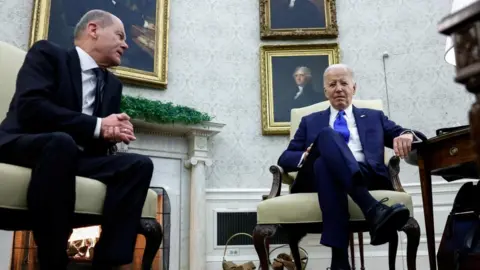 Reuters
ReutersBut on February 16, 2024, just days after that interview and the White House meeting between Chancellor Scholz and President Biden, and before any offer had been made to the Russians, the potential deal collapsed under tragic circumstances.
Arguably the highest-profile prisoner who could have been included in the swap, Alexei Navalny, has died in his Siberian prison cell at the age of 47. Supporters and relatives, as well as many foreign leaders, blamed Mr Putin for his death. Russian authorities said he died of natural causes.
While little was known about the negotiations at the time of his death, Navalny’s colleague Maria Pevchikh publicly stated that he was close to being released in exchange for Krasikov.
BBC News was unable to independently verify her claims at the time. Meanwhile, the Kremlin has publicly denied that a potential deal is close.
But on Thursday, the White House confirmed it had worked to bring Mr Navalny into the deal, with three people who had worked with the opposition figure eventually released from Russian custody.
“The whole team felt like they had no more strength left,” Mr Sullivan said emotionally as he described the impact of Mr Navalny’s death.
Mr. Gershkovich’s mother and father, in a dramatic coincidence, met Mr. Sullivan at the White House on the day Mr. Navalny’s death was announced.
Recognizing the importance of this news and the risk it posed to the negotiations, he told them that “the road ahead will be a little more rocky.”
The potential deal must be restructured and the United States and Germany must regroup.
Vice President Kamala Harris then held two key meetings to help keep the potential swap moving, a senior administration official told the BBC.
She attended the Munich Security Conference in mid-February, where she stressed the importance of releasing Krasikov to Chancellor Scholz.
She also met with the prime minister of Slovenia, which is holding two Russian prisoners identified by the United States as high priority for Moscow. Both were released on Thursday.
Then in the spring, a new deal that no longer included Mr Navalny took shape at the White House. And in June, Berlin agreed to a Krasikov swap.
According to Mr. Sullivan, Mr. Scholz told President Biden: “For you, I will do this.”
The agreement has been submitted to Russia.
Moscow responded a few weeks ago, in mid-July, accepting the terms of the deal and releasing those on the list who were being held in Russian prisons.
But as the talks reached their final stages, domestic politics intervened, with Mr Biden under intense pressure from his own Democratic Party to end his re-election bid in November after a poor debate performance.
According to Mr. Sullivan, just an hour before Mr. Biden announced on July 21 that he would not run for re-election, he called his Slovenian counterpart to complete the prisoner exchange.
Like any high-risk prisoner swap, the deal is not guaranteed even once the planes are lined up and the prisoners’ routes home are finalized.
“We held our breath and prayed until a few hours ago,” Mr. Sullivan said Thursday afternoon.
President Biden later posted a photo of the Americans being released together on a plane headed to US soil, along with a short caption.[They] safe, free and beginning the journey back to the arms of family.”




